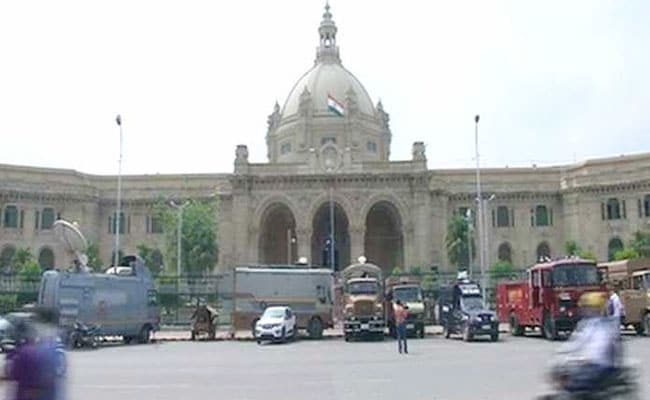
The Uttar Pradesh assembly has 500 policemen working shifts to guard the complex round the clock.
Lucknow:
Indian security agencies have struggled to convince the government to introduce full body scanners at the country's international airports for more than a decade. Uttar Pradesh assembly might just beat them to it and install the machines soon.
Moving swiftly after forensics confirmed that the white powder found under the seat of a opposition legislator was a deadly plastic explosive, Speaker Hriday Narain Dixit announced a string of measures to ramp up security at the assembly premises.
As part of this initiative, Mr Dixit said police commandos, also called Quick Reaction Teams, would be deployed at the assembly's six gates to repulse a terrorist attack.
Already, the assembly has 500 policemen working shifts to guard the complex round the clock.
Apart from baggage scanners, the Speaker also said a decision had also been taken to install whole body scanners at the assembly's six gates.
If the Yogi Adityanath government and the Speaker do implement the announcements, it would make the country's largest state assembly also the most secure. Once it gets the body scanners too, it might perhaps be more secure than some of India's airports too.
The first legislature to mull installing the body scanners was Parliament in Delhi. Back in 2009-10, a top parliamentary committee responsible for overseeing parliament's security had also recommended installing the body scanners. But no decision was taken.
The Central Industrial Security Force - the force that handles air travel security in India at major commercial airports in the country - was able to persuade the government to let it try the body scanner at the national capital Delhi's international airport in December 2016.
About 10,000 passengers were screened using the machine on a voluntary basis; the CISF wanted to gauge passenger reactions as well as the best-suited technology for passenger screening.
The civil aviation ministry told parliament in March this year that it hadn't decided to install the machines yet. According to reports, the CISF will hold another round of trials over the next few months. The last time, there had been complaints that the machine wasn't able to scan through the layers and folds of a woman passenger's saree.
UP Assembly Speaker Hriday Narain Dixit, however, hasn't clarified if lawmakers too would have to pass through the body scanners or only assembly staffers and visitors.
Chief Minister Yogi Adityanath, however, has pushed for a ban on lawmakers bringing their phones into the assembly.
Moving swiftly after forensics confirmed that the white powder found under the seat of a opposition legislator was a deadly plastic explosive, Speaker Hriday Narain Dixit announced a string of measures to ramp up security at the assembly premises.
As part of this initiative, Mr Dixit said police commandos, also called Quick Reaction Teams, would be deployed at the assembly's six gates to repulse a terrorist attack.
Already, the assembly has 500 policemen working shifts to guard the complex round the clock.
Apart from baggage scanners, the Speaker also said a decision had also been taken to install whole body scanners at the assembly's six gates.
If the Yogi Adityanath government and the Speaker do implement the announcements, it would make the country's largest state assembly also the most secure. Once it gets the body scanners too, it might perhaps be more secure than some of India's airports too.
The first legislature to mull installing the body scanners was Parliament in Delhi. Back in 2009-10, a top parliamentary committee responsible for overseeing parliament's security had also recommended installing the body scanners. But no decision was taken.
The Central Industrial Security Force - the force that handles air travel security in India at major commercial airports in the country - was able to persuade the government to let it try the body scanner at the national capital Delhi's international airport in December 2016.
About 10,000 passengers were screened using the machine on a voluntary basis; the CISF wanted to gauge passenger reactions as well as the best-suited technology for passenger screening.
The civil aviation ministry told parliament in March this year that it hadn't decided to install the machines yet. According to reports, the CISF will hold another round of trials over the next few months. The last time, there had been complaints that the machine wasn't able to scan through the layers and folds of a woman passenger's saree.
UP Assembly Speaker Hriday Narain Dixit, however, hasn't clarified if lawmakers too would have to pass through the body scanners or only assembly staffers and visitors.
Chief Minister Yogi Adityanath, however, has pushed for a ban on lawmakers bringing their phones into the assembly.
Track Latest News Live on NDTV.com and get news updates from India and around the world

